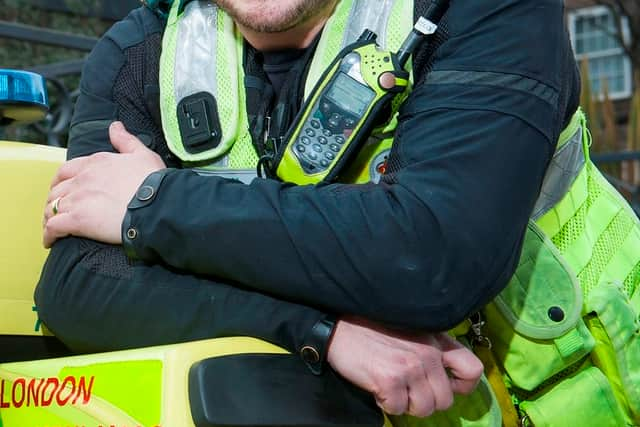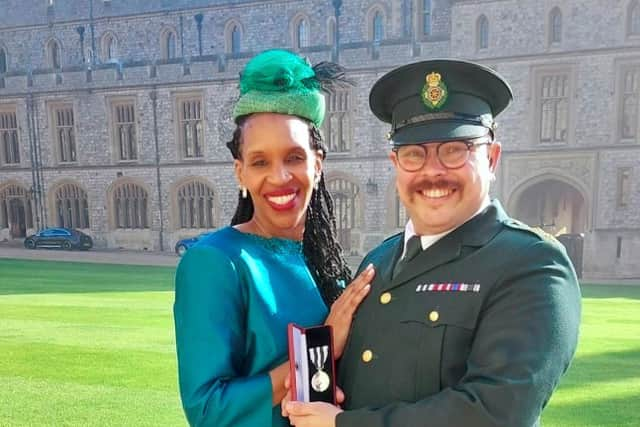Westminster terror attack: King Charles honours paramedic who saved lives after Khalid Masood atrocity
and live on Freeview channel 276
A paramedic who was the first ambulance worker on the scene of the 2017 Westminster terror attack has been given a prestigious award by King Charles.
Richard Webb Stevens, 48, who was born with profound hearing loss, saved lives when terrorist Khalid Masood drove into pedestrians, killing four and injuring more than 50.
Advertisement
Hide AdAdvertisement
Hide AdThe killer then crashed into the gates of Parliament and stabbed unarmed PC Keith Palmer, before being shot dead by by armed police.
As well as being a paramedic, Richard also designed a special in-helmet earpiece for the deaf that has been taken up by police forces, medical professionals and military personnel around the world.
Nearly six years after the attack, Richard has been awarded the prestigious Queen’s Ambulance Medal by the King at Windsor Castle.
He is a motorcycle paramedic for the London Ambulance Service for the last 23 years and was born with profound hearing loss.
Advertisement
Hide AdAdvertisement
Hide AdRichard picked up his medal at Windsor Castle on February 14 for his action during the 2017 terrorist attack at Westminster, as well as his huge contribution to the capital's deaf community.
During his career he became the first deaf paramedic to work on London’s Air Ambulance and now works for the Service’s Motorcycle Response Unit.


On the day of the Westminster terrorist attack, on March 22, 2017, Richard initially thought he had been called to a routine crash on Westminster Bridge.
Richard bravely focused on assessing patients from one end of the bridge to the other and reported back to the control room asking for backup.
Advertisement
Hide AdAdvertisement
Hide AdRemembering the day of the attack, the dad-of-four said: “March 22, 2017 is a day I will never forget, ever.
“It’s a day when I had to put all my years of service into practice into one single call, but I hope I made a difference to people’s lives.”
Richard, from Chipperfield, Hertfordshire, got used to seeing King Charles from a distance when he was stationed on the Mall with his motorbike unit.
But he said seeing his majesty face-to-face was a new and surreal experience.
Advertisement
Hide AdAdvertisement
Hide AdHe added: “Meeting King Charles was quite something and it was quite surreal.
“Speaking to him was lovely. He was so kind and he had a lot of knowledge about what I did and asked me a lot about motorbikes.
“He asked me where I worked and I jokingly said I worked near his mother’s residence once and he smiled.”
He added: “I was so worried about not being able to hear him as there was music playing the whole time but he spoke very slowly and clearly. He’s got a good vernacular and has a deep voice which is good for me.”


Advertisement
Hide AdAdvertisement
Hide AdAs he left the castle with his wife Marie, Richard added: “Meeting the King personally to receive such an important award is something that I never envisaged.
"You hear stories about it, you read about it, but experiencing it was just phenomenal.
“I was very fortunate to be nominated for this award and it’s been absolutely superb to be honoured in such an emotional ceremony.”
In his spare time, Richard mentors generations of paramedics with hearing impairments, committed to levelling the playing field in the emergency services for those with similar conditions to his own.
Advertisement
Hide AdAdvertisement
Hide AdOn joining the Motorcycle Response Unit he found that the in-helmet earpiece used by motorbike paramedics was incompatible with his hearing aid.
When he tried to address the issue, he was told that it couldn’t be altered.
Instead of giving up, Richard decided to take on the challenge himself and successfully adapted the earpiece to work with his hearing aid.
His new design has proved to be such a success that these updated communication systems have been taken up by police forces, medical professionals and military personnel around the world.
Advertisement
Hide AdAdvertisement
Hide AdHe said: “My dad is an acoustic consultant engineer so I grew up with him fixing and designing things.
“When I looked at the earpiece, I thought it’s just an ear mould and there is space in there to add in a tube that connects the hearing aid to the ear.
“I thought surely you could just put another hole through it and put in a sound tube and it will work and it did.
“When it was made and sent to me I connected my hearing aid into the added hole and when I put the radio on it worked just fine.”
Advertisement
Hide AdAdvertisement
Hide AdRichard has also helped make it easier for deaf patients to make 999 calls.
He has supported the launch of a British Sign Language (BSL) app that allows people with hearing or speech loss to be instantly connected to a video call with a BSL interpreter.
Daniel Elkeles, chief executive at London Ambulance Service, said: “I can think of no better person to be honoured for serving London.
"Richard has not only saved countless lives and responded to significant incidents in some very challenging circumstances, but also fought to make the emergency services more inclusive for all.
"We are very proud of him and for everything he has achieved over these 23 years with us.”